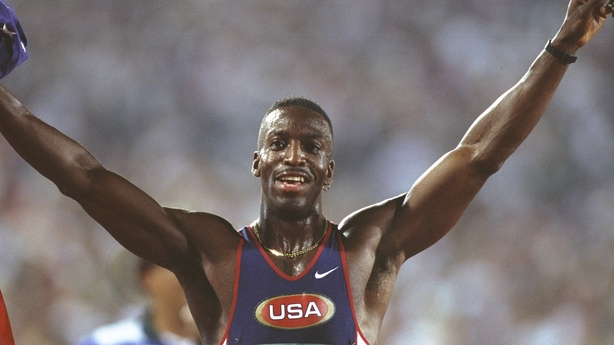Have doctors been honest with him and said that only 10% get to almost full recovery? And that there are no protocols or training regimens to follow?
Olympic mindset helps Johnson with stroke recovery
The 51-year-old Olympic sprint champion says he is "pretty much back to normal" after suffering a transient ischemic attack in September.
Johnson, once the fastest man on the planet, said he had finished a training session at home when he felt a "a strange tingling down my arm and left side".
He "decided not to take any chances" and headed straight to hospital.
"After the MRI scan, I almost fell off the table. I could not walk or move my left leg," he told the BBC.
"It was a lot of emotions. Once I was told I had suffered a stroke and I could not walk things get immediately real.
"You start to think: 'What is my life going to be like going forward? What is my quality of life going to be like? Will I be able to dress myself? Will I be able to take care of myself or will my loved ones have to take care of me?'
"I had a great team of doctors and they said that is what all stroke victims ask but unfortunately there is no answer to the questions - only time will tell.

"Some people make a full recovery,(10%) some make a partial recovery and how much time that takes there is no answer. That is difficult to hear and pretty scary.
"You go from fear to anger asking, 'why did this happen to me?' The first thing doctors say is not to smoke, lose weight, work out and get fit - well that is what I was doing when this happened - and eat right.
"I was doing all the right things so I was pretty angry for half a day."
Johnson, who won 200m Olympic gold at the Atlanta Games in 1996 in 19.32 seconds, said the same distance in hospital took him 15 minutes.
He added: "Doctors said the best chance of recovery was to immediately get into physical therapy.(They lied because they have nothing to back up that statement. Notice that the doctor has nothing to do.)
"I did that two days after the stroke and I got out of bed with assistance and got behind the walker around the hospital - and ironically it was around 200m. I timed it and it took me around 15 minutes to cover that distance.
"Ordinarily that would be very disconcerting and I would have no hope - having been the fastest person in the world at that distance - but I was very encouraged.
"For the next few weeks I went back into an Olympic mindset and focusing on having the best training session I can today and using it to be better and get better. Almost three months on now from the stroke and I am pretty much back to normal and back to work."
No comments:
Post a Comment